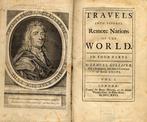Gulliver's Travels in Laputa, Balnibarbi, Luggnagg, Glubbdubdrib, and Japan
5 August 1706 — 16 April 1710
|
After Gulliver's ship was attacked by pirates, he is marooned near a desolate rocky island, near India. Fortunately he is rescued by the flying island of Laputa, a kingdom devoted to the arts of music and mathematics but unable to use these for practical ends. He realizes that the inhabitants are a distracted people who have a very limited attention span and very narrow interests. The houses in Laputa are badly built, thier clothes do not fit and they spend time listening to music. While there, he tours Laputa as the guest of a low-ranking courtier and sees the ruin brought about by blind pursuit of science without practical results, in a satire on the Royal Society and its experiments. |
Gulliver's Travels in the Flying Island of Laputa
|
Gulliver's explains the movement of the Flying Island of Laputa based upon magnetic forces in Laputa and Balnibarbi, the country below. He also explains on how it is used by the King to tyrannize the people of Balnibarbi as the King can cut off sunshine and rain from any region or throw stones at them. From Laputa, Gulliver is then taken to Balnibarbi, where he visits Munodi. Most of Balnibarbi, is barren except for Munodi's estate which is green as he follows the customs of his ancestors. Gulliver visits the Grand Academy and watches the experiments being done. The intention is to improve some process, product, or human behavior for the good of humanity. Gulliver observes projects like trying to extract sunshine from cucumbers, trying to reduce human excrement to its original food and making gunpowder from ice. There are also language projects with the goal of abolishing words. The political scientists are also insane with ideas like exposing treasonous plots by examining excrement because people are most thoughtful on the toilet. |
Gulliver meets Alexander, Hannibal, etc. who are brought back from the dead
|
Gulliver takes a short side-trip to the island of Glubbdubdrib, where he visits a Sorcerer's dwelling and meets the Governor who can make people appear from the dead. Gulliver then meets and discusses history with the ghosts of historical figures, the most obvious restatement of the "ancients versus moderns" theme in the book. He meets Alexander, Hannibal, Ceasar, Brutus, Homer, Aristotle, etc. In Luggnagg he encounters the struldbrugs, unfortunates who are immortal, but not forever young, but rather forever old, complete with the infirmities of old age and considered legally dead at the age of eighty. He later finds a boat headed for Japan. After reaching Japan, Gulliver asks the Emperor "to excuse my performing the ceremony imposed upon my countrymen of trampling upon the crucifix", which the Emperor grants. Gulliver returns home, determined to stay there for the rest of his days |
|
|
|
|
Gulliver's Travels in Laputa, Balnibarbi, Luggnagg, Glubbdubdrib, and Japan - Chapter Summary
CHAPTER I.
Gulliver sets out on his third voyage. Is taken by pirates. The malice of a Dutchman. His arrival at an island. He is received into Laputa.
CHAPTER II.
The humours and dispositions of the Laputians described. An account of their learning. Of the king and his court. Gulliver’s reception there. The inhabitants subject to fear and disquietudes. An account of the women.
CHAPTER III.
A phenomenon solved by modern philosophy and astronomy. The Laputians’ great improvements in the latter. The king’s method of suppressing insurrections.
CHAPTER IV.
Gulliver leaves Laputa; is conveyed to Balnibarbi; arrives at the metropolis. A description of the metropolis, and the country adjoining. Gulliver hospitably received by a great lord. His conversation with that lord.
CHAPTER V.
Gulliver permitted to see the grand academy of Lagado. The academy largely described. The arts wherein the professors employ themselves.
CHAPTER VI.
A further account of the academy. Gulliver proposes some improvements, which are honourably received.
CHAPTER VII.
Gulliver leaves Lagado: arrives at Maldonada. No ship ready. He takes a short voyage to Glubbdubdrib. His reception by the governor.
CHAPTER VIII.
A further account of Glubbdubdrib. Ancient and modern history corrected.
CHAPTER IX. Gulliver returns to Maldonada. Sails to the kingdom of Luggnagg. Gulliver confined. He is sent for to court. The manner of his admittance. The king’s great lenity to his subjects.
CHAPTER X.
The Luggnaggians commended. A particular description of the Struldbrugs, with many conversations between Gulliver and some eminent persons upon that subject.
CHAPTER XI.
Gulliver leaves Luggnagg, and sails to Japan. From thence he returns in a Dutch ship to Amsterdam, and from Amsterdam to England.







